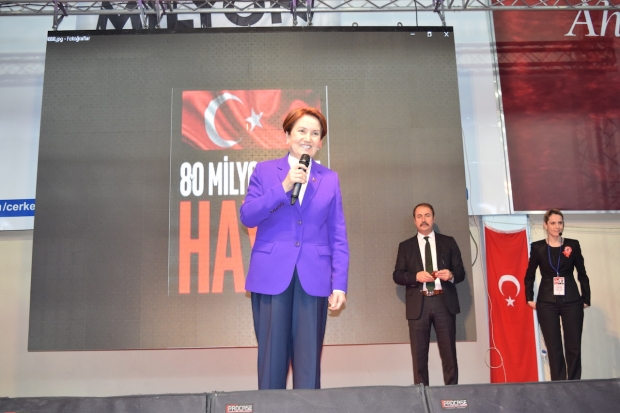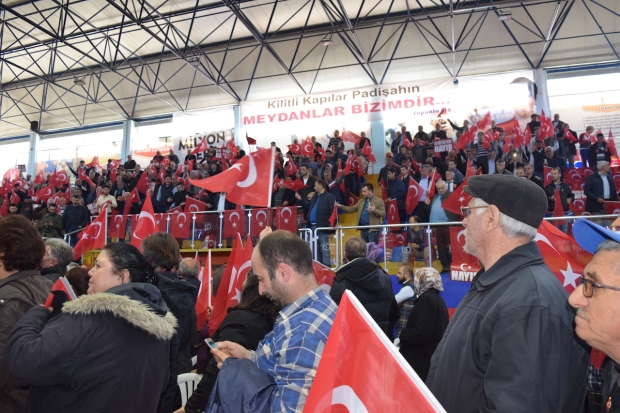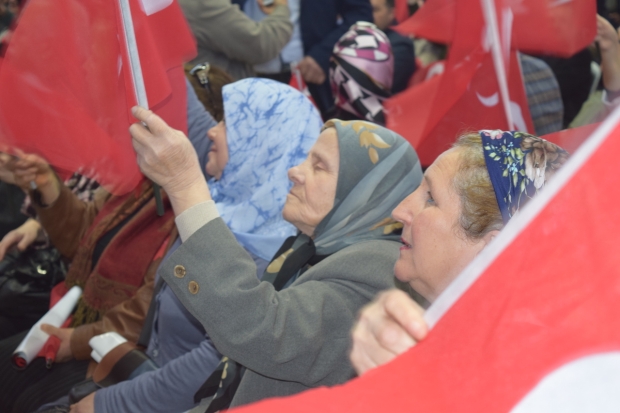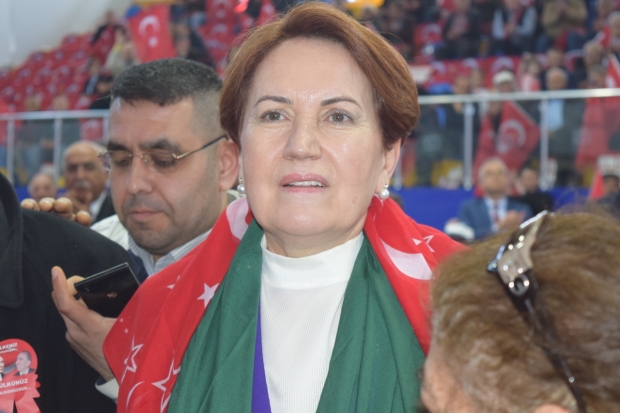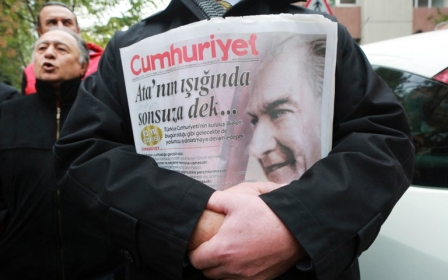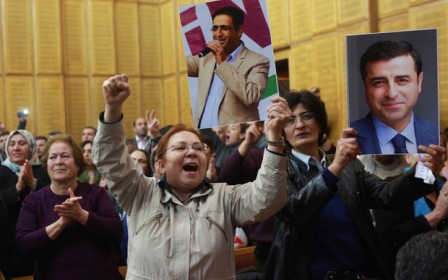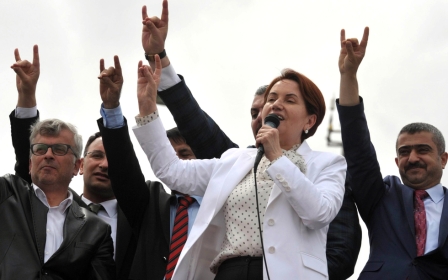Meral Aksener, the wolf at Turkish president's door
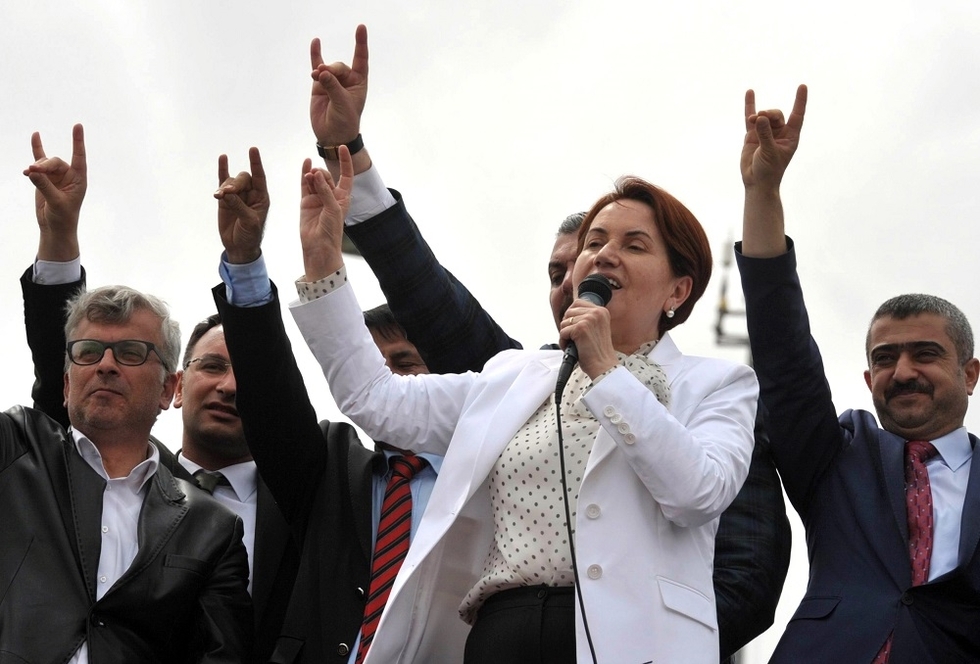
TEKIRDAG, Turkey – Meral Aksener strides into the packed sports hall in the industrial town of Cerkezkoy exuding calm confidence. The approximately 1,500-2,000 people gathered to hear her speak erupt into a chant of "prime minister Meral".
The 61-year-old raises aloft her right palm – covered in a henna-drawn map of Turkey, which has become her trademark – and tells the crowd: "Unlike others we are not desperately trying to cling on to our seats in power or for personal gain.
"We are gathered here for the future of our country. And it is for the future of our country that we say No."
She has become one of the main faces of the bloc opposed to the constitutional amendments being put to a referendum on 16 April. If endorsed by the public, it would vastly expand the president’s powers while weakening existing mechanisms of checks and balances.
The No bloc is diverse and represents various shades of the political spectrum from the social-democrat Republican People’s Party (CHP) to the mainly pro-Kurdish Peoples’ Democratic Party (HDP), to various small Islamist groups.
Aksener stands out because she represents the right and centre right, which forms the core support of the ruling Justice and Development Party (AKP) and its current ally the Nationalist Movement Party (MHP).
Fearing an erosion of support from within their own support base, Aksener and her allies have faced multiple attacks and hardships as they try to campaign for a No vote.
The power was cut at the venue she was set to address her supporters in Canakkale. She addressed the meeting using a battery-powered megaphone and with supporters using their mobile phones to provide light.
A campaign rally she held in the town of Izmit, Kocaeli, was attacked by a 40-50-strong mob.
An appearance by her in the Anatolian town of Nigde was banned by the provincial governor – using powers granted to him under the state of emergency - but she defied the ban and proceeded to address her supporters.
Aksener remains unfazed by these attacks and has continued campaigning in full voice against the constitutional amendments.
The seasoned politician has often proved her mettle and toughness by taking on the toughest jobs in a male-dominated Turkish political environment.
She became Turkey’s first female interior minister on 8 November 1996, during the decade when the fighting between the Turkish state and the Kurdistan Workers’ Party (PKK) was at its most vicious.
She was interior minister in the coalition government led by Islamist leader Necmettin Erbakan until her dismissal on 20 June 1997 as a result of what is called the post-modern coup of 28 February, 1997.
A memorandum by the military listing its demands effectively led to the downfall of the Erbakan-led coalition government.
A new centre-right party?
The attacks against Aksener, however, could also be the result of increased political backstage murmurs regarding the emergence of a new centre-right party that could pose a real threat to AKP dominance.
These murmurs were first heard when Aksener – who joined the MHP in 2001 - was sidelined by MHP leader Devlet Bahceli in November 2015, which led to her challenging him for the party leadership and her subsequent dismissal from the party.
The rumours have taken on extra resonance after both the AKP and MHP have developed internal fractures over the constitutional amendments that would see the country abandon the parliamentary system for an executive presidency.
Aksener has kept silent on any talk of a new centre-right party or of any potential role she would have in it. Her only comment on the matter was to the Cumhuriyet newspaper where she said she "hadn’t given up on her plans for the MHP’s leadership" regardless of a Yes or No win in the referendum.
Two sources within Turkey’s nationalist movement and close to the Aksener camp told Middle East Eye that she would not comment on this topic until the referendum was over.
Her past as a member of the centre-right True Path Party and also her initial involvement during the establishment of the AKP, along with the widespread support she enjoys among the MHP grassroots is likely to aid her on whichever path she opts to take post referendum.
A modern-day ‘Asena’
In an unscientific street poll conducted with 20 MHP supporters by Middle East Eye last week in the central Anatolian town of Cankiri, a former MHP bastion, 14 held Aksener in such high regard that they called her Asena – a likening not easily nor often conferred by the massively patriarchal and conservative Anatolian population.
Asena is the name given to the she-wolf in Turkish nationalist mythology. Asena plays a key role in the establishment of the Turkic empire and as its leader.
Such is her support and clean background that Aksener remains one of the few who have managed to remain untarnished by slurs made against her that she is linked to the Fethullah Gulen movement by supporters of the president, Recep Tayyip Erdogan, and MHP leader Bahceli.
Turkey blames Gulen, a US-based Turkish preacher and staunch AKP ally turned foe, and his supporters of orchestrating last July’s failed coup attempt. More than 125,000 people have been affected in the purge that has followed of real and imaginary Gulen supporters.
Meanwhile, in the sports hall in Cerkezkoy, Aksener is only focused on explaining the referendum and why people should vote No, and to expose the ruling party’s shortcomings.
"They (Erdogan and the AKP] have become the one-party state they hated and abused so much. If you liked it so much why did you attack it all these years?" she said.
"This is not about Erdogan. It is wrong to give someone so much power to be able to choose ministers, MPs, judges. The parliamentary system serves as Turkey’s safety fuse."
She slammed the government’s actions in northern Syria.
"What did we go to al-Bab for? What did 71 of our young men get martyred for? Why did we decide to retreat from Syria? Has any of them been able to give us an answer to any of these questions? Now they want us to grant the sole power to take us to war to this one man."
She also lashed out at the economic stagnation the country has been led into.
"One out of four youths is unemployed. Average unemployment has passed 13 percent. Is granting you more power going to solve this?"
"They [the AKP] call us terrorists and Gulenists for gathering to say No. I have told the prime minister and people in his party how to find the Gulenists," she said.
And she didn’t hold back on addressing the government’s penchant to label all its opponents as Gulenist terrorists.
They [the AKP] call us Gulenists for gathering to say No. They should look in the mirror to see the real Gulenists
- Meral Aksener
"They should look to their right, they will see many Gulenist friends and relatives.
"They should look to their left, they will also see many Gulenist friends and relatives. And then they should look in the mirror to see the real Gulenists."
Appointed officials such as governors are required to be non-partisan but, according to Aksenar, are at the beck and call of the ruling party and only serve the powerful.
She said the Ankara governor had denied her request to hold a gathering in the capital’s Tandogan or Sihhiye squares.
Officially, she said, the governor told her the reason was he couldn’t guarantee her safety and that unofficially it was because he was thinking of her and didn’t want her to be embarrassed by a poor turnout.
"Why are you even in your post if you can’t guarantee the safety of a citizen? Unlike these people (officials] I don’t need to be protected by helicopters and armoured cars. Is there any better protection than my nation itself?" she said.
"Don’t you worry about attendances. Just allocate one of those squares. I know my people and supporters won’t let me down.
"If they do, I will go home and just be a grandmother. What are you so scared of? I am just a simple woman with no title or position called Meral Aksener."
She said the only positive to take out of this attempt to change the system was that it made people "remember again and reaffirm their commitment to the values of Ataturk and the republic".
After a nearly hour-long speech she left the sports hall exhorting people to vote No amid chants of "prime minister Meral" from the gathered crowd.
Middle East Eye propose une couverture et une analyse indépendantes et incomparables du Moyen-Orient, de l’Afrique du Nord et d’autres régions du monde. Pour en savoir plus sur la reprise de ce contenu et les frais qui s’appliquent, veuillez remplir ce formulaire [en anglais]. Pour en savoir plus sur MEE, cliquez ici [en anglais].


